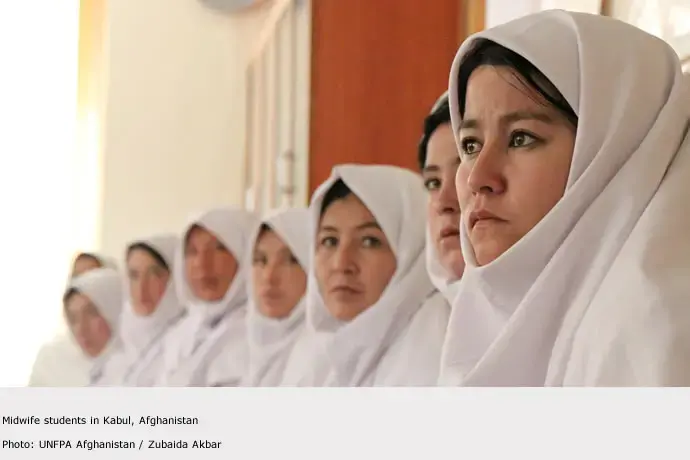Kabul, 10th December 2014 - A four-fold increase in investment in midwifery is necessary in the next 15 years to meet 60 percent of the needs for maternal and reproductive health services according to the State of Afghanistan's Midwifery 2014 report presented today by the Ministry of Public Health, the Afghan Midwifery Association, the United Nations Population Fund, the World Health Organization and the United States Agency for International Development.
The State of Afghanistan's Midwifery 2014 shows the achievements and challenges of the midwifery profession in the country with a focus in the availability, accessibility, acceptability and quality of the services provided.
"Afghanistan is a regional leader on the midwifery profession and a model for reducing maternal mortality in post-conflict settings," Dr Ahmad Jan Naeem, Acting Minister of Public Health during his opening remarks. "In 2002, there were only 467 midwives in the country. A decade later, more than 4,600 midwives work in Afghanistan and they have been instrumental in reducing Afghanistan's maternal mortality from 1,600 to 327."
As the report points out, although there has been progress, only 23 percent of the needs for maternal and reproductive health services are currently met. "Increased investment in midwifery is needed so the majority of women in Afghanistan will be able to plan their family and deliver their babies safely," said Dr Annette Sachs Robertson, UNFPA Representative for Afghanistan. "There is a need to increase the number and efficiency of educated professional midwives and improve recruitment policies, career pathways and retention policies," said Dr Robertson.
Investment in the availability of services is one of the key recommendations of the report, which also highlights Afghanistan's achievements in promoting the quality of services provided. According to the report, Afghanistan is amongst the first countries in the South Asia region to educate internationally recognized degree-level midwives.
"Until 2011, midwives were educated through two routes: an accelerated two-year direct entry programme through the Institute of Health Services and a direct entry community midwifery programme," explained Hellay Gharsin, Acting President of the Afghan Midwives Association. "Currently Afghanistan is proud to have a four-year midwifery bachelor degree and a bridging programme to build the capacity of existing midwives, two initiatives that will enhance the quality of the maternal and reproductive health services in our country," said Gharsin.
"More investment is needed in improving and enforcing recruitment and retention policies for the different cadres of midwives to guarantee that professional trained midwives are available to provide quality services to women and new-borns at the various levels of the health system," said WHO Country Representative Dr Rik Peeperkorn. "We need to ensure that midwives are valued and receive recognition for the invaluable work they do for maternal and child health in Afghanistan as critical health professionals."
In terms of acceptability, the report documents the effort of the Ministry of Public Health to establish a Midwives and Nurses Council to guarantee midwives' and nurses' competencies and the quality of the services delivered by them, both in rural and urban areas in Afghanistan.
"USAID is proud to be part of this governmental effort led by the Ministry of Public Health to improve the maternal and reproductive health services of Afghanistan," said the Representative from USAID. "Investing in midwifery is essential for the provision of these services and Afghanistan has shown a strong political commitment in this regard, putting mother's and newborns' health at the top of the health agenda."




